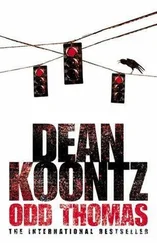Pulling the pistol from my waistband, I rose and went to the break in the railing. I descended the gangway boldly, hoping that even if someone stepped onto the foredeck or the bridge deck and saw me, they would see only a figure in the mist and would assume that I was one of them.
Echoing across the bay, the foghorn sounded like the plaintive call of a prehistoric behemoth, the last of its kind crying out in loneliness.
I reached the bottom without raising an alarm, and crossed the slip to the second gangway. The afterdeck had such a low profile that I could see the two men up there working at the small crane.
Their backs were still turned to me, and I risked setting foot on the second gangway. The first had been a permanent feature of the dock, and therefore solid; but this much shorter ramp was detachable and collapsible and, it seemed to me, fearsomely noisy. Nonetheless, I boarded the tug without drawing attention.
Jackie and his friend were no more than twelve feet away. The halogen lamp burned through the fog with such intensity that, if they turned, they would be able to see me clearly enough to know that I wasn’t one of them.
The quickest route off this deck was up a set of six open stairs to the foredeck, immediately to my right. The higher deck encircled a portholed structure containing spaces that an experienced seaman would be able to identify but that were, to me, as mysterious as any female wrestler’s boudoir-and just as scary.
Instinct told me that I would be less likely to encounter people if I went below decks. The bulkhead that separated the afterdeck from the forward structures featured a door that most likely would take me where I wished to go.
I had to walk across half the width of the afterdeck, behind the two laboring men, through the bright halogen backwash, but I reached the door, opened it, and stepped through without being shot in the back.
Beyond lay a landing at the top of an enclosed companionway. I descended the circular stairs to a narrow, low-ceilinged passageway with cabin doors on both sides and another door at the farther end, which was well aft of the bow.
Understandably, you may at this point be wondering What is this bozo’s plan?
As usual, I had no plan. After the fact, it might sometimes appear to a celestial observer-if one happened to be tuned in to Channel Odd-that I had performed according to a meticulously worked-out strategy, using well-rehearsed tactics executed to an operations schedule timed with a stopwatch. As you know, I make it up as I go along, heart in my throat and bowels quivering near a state of collapse.
Over the years, I have found that my seat-of-the-pants approach works well. Except when it doesn’t.
By doing, I learn what to do. By going, I learn where to go. One day, by dying, I’ll learn how to die, and leave the world and hope to land in light.
Pistol ready, I went forward along the passageway, ignoring doors to the left and the right, behind which might wait the lady or the tiger, neither of which I wanted. All I asked was that I be spared surprises, although in this world of six billion souls, all acting with free will and too many with audacity, surprises are inevitable, too few of them the kind that make you smile and that lift your heart.
Easing open the door at the end of the corridor, which bucked one of my cherished traditions by swinging smoothly on quiet hinges, I was pleased that I did not at once receive a bullet in the face. I stepped across the raised threshold into the engine room.
An extravagance of cool machinery and a maze of pipes crowded this compartment, a three-dimensional jigsaw fitted to perfection in the stingy space, a testament to the engineering skills of humanity. High maintenance standards resulted in a room that was cleaner than many kitchens, with fresh paint everywhere and not a spot of rust to be seen.
Evidently, not everyone in the harbor department was distracted by plots to destroy civilization.
Once in the compartment, I hesitated to close the door, though I seemed to be alone.
This was a tugboat, not a battleship or even a destroyer, so the engine room didn’t have a lovable but tough Scottish-American warrant officer overseeing a jokey but dedicated team of sweaty enlisted men who-between poker games and harmonica interludes and sappy conversations about their girls back home-were forever tormented by boilers failing, boilers overheating, pipe joints bursting from too much pressure, and a host of other crises. Nobody needed to be stationed in this compartment for the vessel to go about its work with efficiency, which is one reason why Hollywood never made a great World War II movie about a tugboat.
Because the lights had been on when I opened the door, however, I had to assume that someone had recently been here and intended to return.
As I was about to retreat and search for another hiding place, I heard a crewman descending the companionway. I closed the door behind me.
Although the equipment was tightly fitted, the layout allowed for repair. I snaked quickly through the service aisles, toward the point farthest from the entrance. Unfortunately, the farthest point was not far enough to make me feel safe from discovery.
Crouched behind shielding pumps and pipes, I had no view of the door, but I heard it open and close.
Someone had entered, though he did not seem to be doing anything but standing over there. The engines were not even idling yet, and the quiet in the compartment was such that I would have heard anyone moving around.
As I had admitted to Chief Hoss Shackett, when I was suffering from amnesia and unable to remember that I wasn’t Matt Damon, I am a guy with a good imagination, which now kicked into overdrive. I envisioned the newcomer, in a gas mask, preparing to pull the release pin on a canister of poisonous chemicals, to kill me as if I were a cockroach.
Before I could elaborate this simple scenario into an opera, the door opened again, and I heard someone say, “What the hell happened to you?”
The reply came in the distinctive bearish voice of Utgard Rolf: “I fell down.”
“Fell down what?”
“Some stairs,” Rolf said.
“Stairs? How many stairs?”
“I didn’t count them, idiot.”
“Man, that’s gotta hurt.”
Utgard closed the door behind him. “Been a change of plans. We’ve got to cut some throats.”
ON THE FARTHER SIDE OF THE ENGINE ROOM, which was nearer than I would have liked, Utgard Rolf said, “Listen, Joey, once we have the packages aboard, we won’t return to the harbor.”
“What? Why not?”
“There’s a guy, he’s onto the operation.”
“What guy?” Joey asked.
“A government sonofabitch.”
“Oh, man.”
“Don’t freak.”
“But we kept this so tight .”
“We’re gonna find him. He’s as good as dead.”
With sharp anxiety, Joey said, “He’s here in Magic Beach?”
“What do you think, I fell down some stairs in Washington?”
“This guy was the stairs?”
“Don’t worry about it.”
“How big is the guy, he could do this to you?”
“He looks worse than I do.”
I resisted the urge to stand up and disprove that boast.
“If we don’t go back to the harbor,” Joey wondered, “where we gonna go?”
“You know the abandoned boatyard south of Rooster Point?”
“That’ll work,” Joey said.
“Damn right it will. The facilities there, the privacy, it’ll be an easier off-load than we’d have in the harbor.”
“The trucks know the new meet?”
“They know. But here’s the thing.”
“I see what’s comin’,” Joey said.
“We need five of us to take delivery at sea, but the way things are at the boatyard, three can handle the off-load.”
Читать дальше
Конец ознакомительного отрывка
Купить книгу








![Dean Koontz - You Are Destined To Be Together Forever [an Odd Thomas short story]](/books/705298/dean-koontz-you-are-destined-to-be-together-foreve-thumb.webp)



